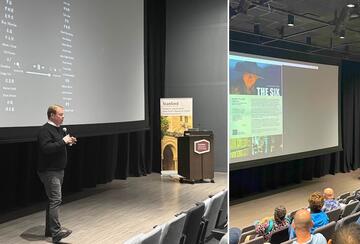China Program at APARC - News

From the practices of higher education institutions to diaspora networks, talent return programs, and immigration policies of central governments, a comparative analysis by Stanford sociologist Gi-Wook Shin shows how different national human resource strategies shape economic success.

China studies expert Jessica Chen Weiss of the Johns Hopkins School of Advanced International Studies reveals how the Chinese Communist Partyʼs pursuit of domestic survival, which balances three core pillars, drives Beijingʼs assertive yet pragmatic foreign policy in an evolving international order.
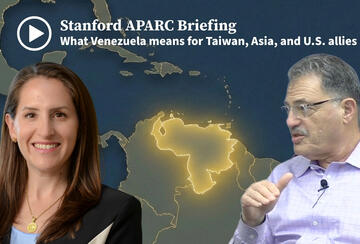
Speaking on the APARC Briefing video series, Larry Diamond and Oriana Skylar Mastro analyze the strategic implications of the U.S. operation in Venezuela for the balance of power in the Taiwan Strait, Indo-Pacific security, America’s alliances, and the liberal international order.
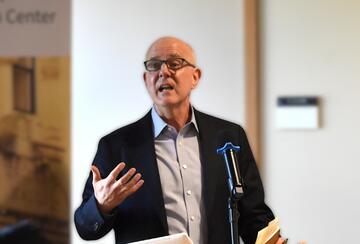
Eurasia Group’s David Meale, a former Deputy Chief of Mission at the U.S. Embassy in Beijing, reflects on the last 30 years and describes how the two economic superpowers can maintain an uneasy coexistence.
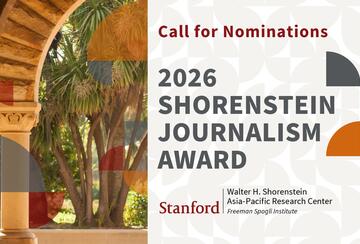
Sponsored by Stanford University’s Shorenstein Asia-Pacific Research Center, the annual award recognizes outstanding journalists and news media outlets for excellence in covering the Asia-Pacific region. News editors, publishers, scholars, and organizations focused on Asia research and analysis are invited to submit nominations for the 2026 award through February 15, 2026.
At a film screening and discussion of the documentary 'The Six,' which illuminates the untold stories of the six Chinese survivors of the Titanic, film co-creator and lead researcher Steven Schwankert spoke with audience members about the making of the documentary, the surprising discoveries behind it, and the challenges of historical research in and about China.
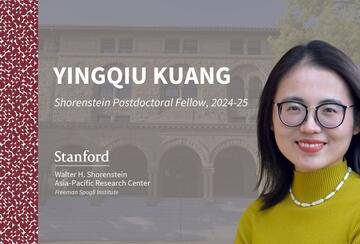
In this interview, Shorenstein Postdoctoral Fellow on Contemporary Asia Yingqiu Kuang discusses her research on the transformation of global technology governance, focusing on how China and other East Asian economies are influencing emerging technical standards and redefining the rules that underpin digital innovation.
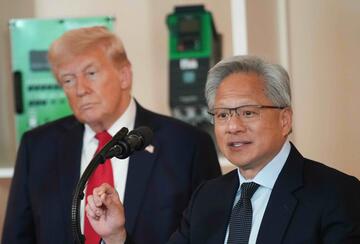
Invoking national security and the economic rivalry with China, the Trump administration is pursuing legally dubious interventions and control of private industry, with potentially high costs for US dynamism. Like the panic over Japan's rise in the 1980s, the administration's response is unwarranted and counterproductive.
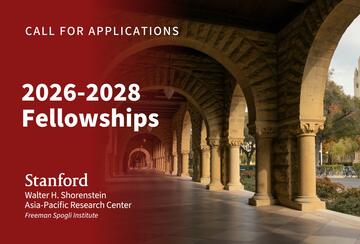
The center offers multiple fellowships in Asian studies to begin in fall quarter 2026. These include a postdoctoral fellowship on political, economic, or social change in the Asia-Pacific region, postdoctoral fellowships focused on Asia health policy and contemporary Japan, postdoctoral fellowships and visiting fellow positions with the Stanford Next Asia Policy Lab, and a visiting fellow position on contemporary Taiwan.
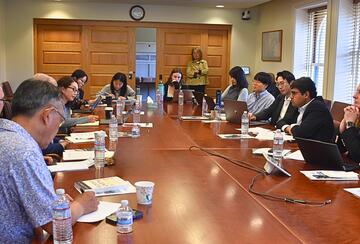
Stanford Next Asia Policy Lab Probes Political Messaging and Public Attitudes in U.S.-China Rivalry
At a recent conference, lab members presented data-driven, policy-relevant insights into rival-making in U.S.-China relations.
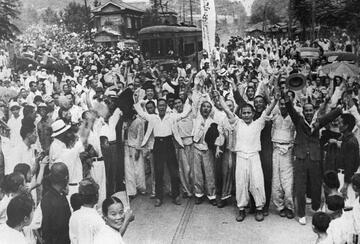
Within Asia, World War II memories and commemorations are not only different from those in the United States but also divided and contested, still shaping and affected by politics and nationalism. Only when U.S. and Asian leaders come together to mark the end of the Asia-Pacific war can they present a credible, collective vision for the peace and prosperity of this important region.

New research by a team including Stanford health economist Karen Eggleston provides evidence about the positive impact of China’s urban-rural health insurance integration on mental well-being among rural seniors, offering insights for policymakers worldwide.

A co-authored study by a team including Stanford political scientist Jean Oi traces how the Chinese central government’s shifting policies during the COVID pandemic exposed its fiscal fault lines and created a local government liquidity crisis.

Political Signaling in an Uncertain World: Brandon Yoder’s Empirical Lens on Chinese Foreign Policy
Brandon Yoder, APARC’s 2024–25 Stanford Next Asia Policy Fellow, focuses on a central challenge in international politics: how states can credibly signal their intentions and avoid war. His work investigates this question in high-stakes contexts, such as during power shifts, amid strategic uncertainty, and in multi-actor settings where traditional signaling models often fall short.

President Trump's tariff policy will serve no one's interests, says Thomas Fingar, a Shorenstein APARC Fellow at Stanford University's Freeman Spogli Institute for International Studies.
US Research in Retreat?
Zealous measures to defend against foreign exploitation of university-based research would be inadequate to preserve US preeminence in science and technology without much greater effort to strengthen US capabilities.

APARC’s 2024-25 Shorenstein Postdoctoral Fellow on Contemporary Asia Shilin Jia researches the careers of high-level Chinese political elites during the economic reform period from 1978 to 2011. Using a quantitative approach, Jia explores how China's party-state orchestrated elite circulation as a governance tool during a time of significant economic and political transformation.

APARC's 2025 Oksenberg Symposium explored how shifting political, economic, and social conditions in China, Russia, India, and the United States are reshaping their strategies and relationships. The discussion highlighted key issues such as military and economic disparities, the shifting balance of power, and the implications of these changes for global stability, especially in the Indo-Pacific region.

Drawing from her book "Upstart," Oriana Skylar Mastro joins Michael McFaul on World Class to discuss what the United States is getting wrong about its strategy toward China, and what America should do differently to retain its competitive advantage.

It became clear, certainly by 1978, that educational exchanges, access to training, and export controls — these were going to be litmus tests of U.S.-China relations.

The TikTok ban case exposes a new reality: Contrary to widespread predictions that globalization would lead to the statelessness of large corporations, weaponized interdependence has heightened the salience of questions about corporate identity and control, as well as informal channels of state influence over commercial enterprises. TikTok’s identity crisis reveals the limitations of standard corporate law doctrines in satisfying policymakers focused on national security and geopolitical rivalry.
The US-China relationship in 2025 is expected to remain largely unchanged from the status quo established in 2008, despite changes in leadership and global circumstances. While improved relations could benefit China's economy and help address internal issues, the risks associated with reengagement and necessary reforms, in the eyes of the Chinese leadership, outweigh the benefits. Meanwhile in Washington, China's policy doesn't seem to be a pressing concern as Trump is more focused on domestic affairs.

Sponsored by Stanford University’s Shorenstein Asia-Pacific Research Center, the annual Shoresntein Award promotes excellence in journalism on the Asia-Pacific region and carries a cash prize of US $10,000. The 2025 award will honor an Asian news media outlet or a journalist whose work has primarily appeared in Asian news media. Nomination entries are due by February 15, 2025.

APARC recently hosted two panels to consider what a second Trump presidency might mean for economic, security, and political dynamics across Asia and U.S. relations with Asian nations.


